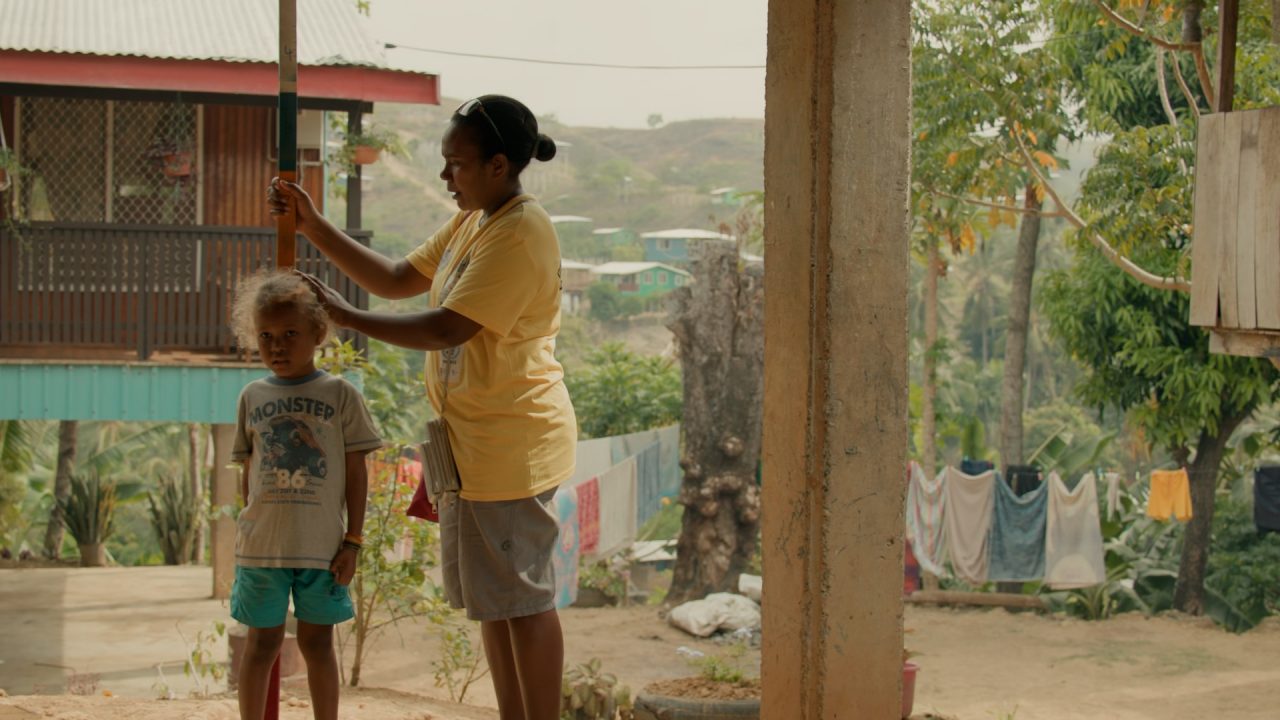

Macquarie 50th Anniversary Award
The World Scabies Program is working with governments and partners to eliminate scabies as a public health problem. It aims to put scabies control on national and global agendas, implement community wide treatment strategies, and strengthen health systems to monitor and manage scabies.

involved in mass drug administration for scabies: Fiji and Solomon Islands1
people provided with medication to protect them from scabies1
reduction in scabies prevalence in Fiji and on track in Solomon Islands1
The World Scabies Program (WSP) was awarded the Macquarie 50th Anniversary Award funding to help translate scabies control research into global public health action and reduce the impact of scabies on children and communities.
Since 2019, WSP has significantly expanded its operations and established a model for scabies control through its successful mass drug administration (MDA) pilot programs in Fiji and the Solomon Islands.1 MDA is a strategy where people over a large area receive treatment regardless of their disease status. In WSP’s MDA, the safe and effective drug ivermectin was utilised.
Thanks to the Award’s support, WSP has built the capacity of senior and field health staff across both Fiji and the Solomon Islands through training on scabies identification and management, supported both countries to manage scabies within existing health systems and demonstrated the strategic importance of addressing a neglected tropical disease such as scabies.
Alongside the reduced prevalence of scabies and related skin infections, such as impetigo, now seen in these countries, WSP has also more broadly helped elevate scabies as a global public health issue. The World Health Organization (WHO) has now set global targets for scabies prevalence in 194 countries, with WSP contributing to the development of WHO guidelines on scabies control.
World Scabies Program would not have the global profile and influence it has today without the Macquarie Group Foundation’s support.”
Dr Andrew Steer
Director of Infection, Immunity and Global Health, and Group Leader of the Tropical Diseases Research Group
Murdoch Children’s Research Institute
A highlight for me was conducting the human centred design (HCD) training to World Scabies Program team and running brainstorm sessions around increasing local awareness of scabies in Fiji and the Solomon Islands. Our outputs from brainstorm sessions were turned into promotion posters, radio and video advertisements. It was exciting to share Macquarie’s understanding of HCD and use it to create real world impact.”
Wei Sheng
Associate Director
Macquarie Group, Sydney
Solomon Islands Survey: WSP is awaiting the results of the Solomon Islands prevalence survey, which will confirm the extent to which scabies incidence has been reduced in the country.
Implementation in Kiribati and beyond: WSP is implementing MDAs in Kiribati and has plans to conduct a survey in French Polynesia, as well as work in Samoa, Tuvalu, and Tonga.
Tracking and advocacy: WSP will continue to track progress against WHO targets and advocate for strengthened programmatic responses to scabies control.
Sarah Teddy, headmistress at Kukum SDA School in the Solomon Islands, talks about the challenges children with scabies face at school in the above video in English, or watch in her native language, Pidgin.
In FY2024, the Murdoch Children’s Research Institute’s World Scabies Program (WSP) completed its mass drug administration (MDA) program to treat scabies in Fiji and undertook surveys to assess the reduction in both scabies' prevalence and severity.
In the Solomon Islands, WSP commenced its second round of MDA and continued providing close support to the Neglected Tropical Disease Unit at the Ministry of Health. WSP has also completed scabies prevalence surveys in Kiribati and French Polynesia and engaged with other countries seeking guidance on scabies control.
In FY2023, the World Scabies Program rolled out a mass drug administration program, helping to protect millions of people across Fiji and the Solomon Islands from scabies.
The first round of mass drug administration in the Solomon Islands and Fiji was completed on 1 July 2023.
In FY2022, research released by Murdoch Children’s Research Institute’s World Scabies Program in collaboration with the Fiji Ministry of Health and Medical Services and the Kirby Institute at the University of New South Wales, noted one dose of the anti-parasite drug Ivermectin is just as effective as two doses at significantly reducing the spread of scabies.1 This study paves the way for a more cost effective and efficient one-dose strategy for scabies control in countries where the disease is endemic, such as Fiji and the Solomon Islands where the Macquarie Group Foundation’s funding is helping to significantly reduce the incidence of scabies and prevent further disease.
In FY2021, the World Scabies Program, working to eliminate scabies in Fiji and the Solomon Islands, continued its preparations to roll out a community-level, mass drug administration of Ivermectin to protect people against scabies and its associated economic and health problems.